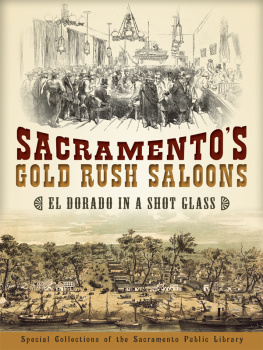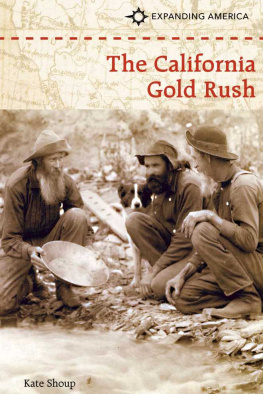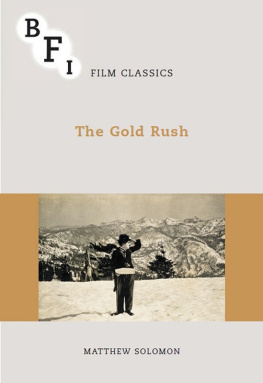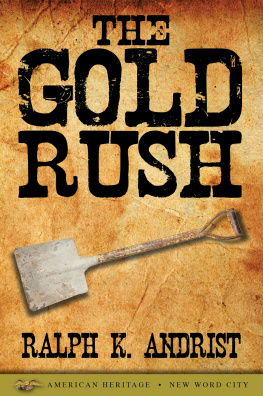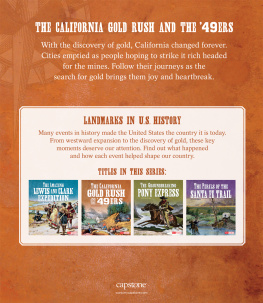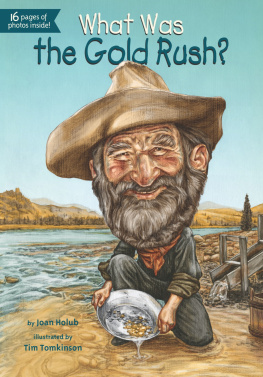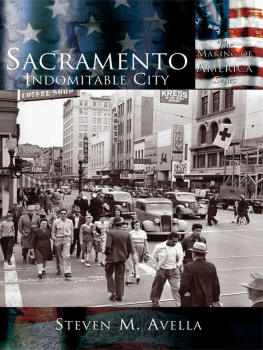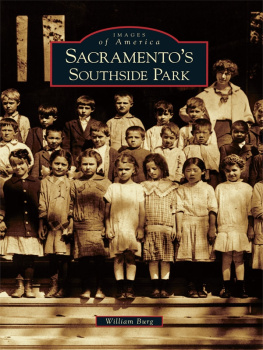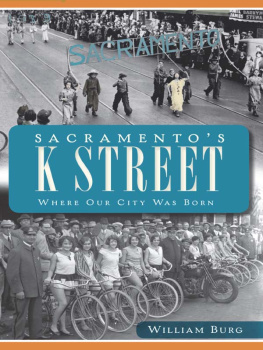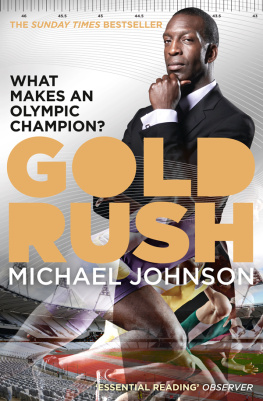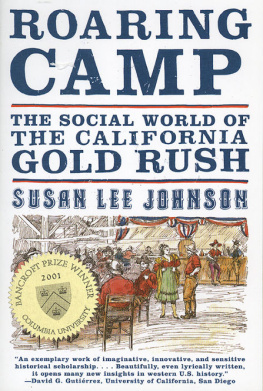
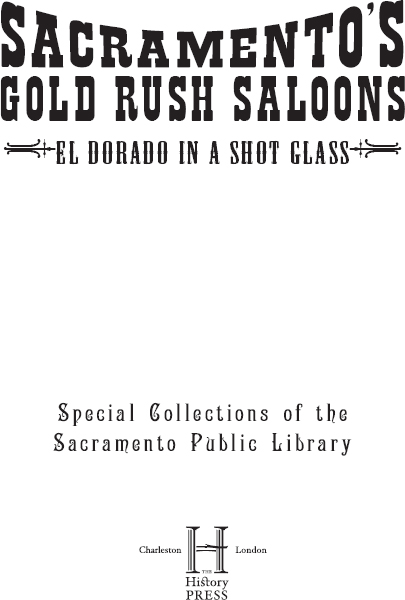
Published by The History Press
Charleston, SC 29403
www.historypress.net
Copyright 2014 by Special Collections of the Sacramento Public Library
All rights reserved
Front cover, bottom: A birds-eye view of Sacramento drawn by G.V. Cooper on December 20, 1849. Captured is the base of J Street along with I, J and K Streets. Library of Congress.
First published 2014
e-book edition 2014
ISBN 978.1.62584.625.9
Library of Congress Cataloging-in-Publication Data
Sacramento Public Library (Sacramento, Calif.). Special Collections.
Sacramentos gold rush saloons : El Dorado in a shot glass / Special Collections of the Sacramento Public Library.
pages cm
Summary: Explore the history of the many saloons that sprang up in Sacramento during the bustling Gold Rush era--Provided by publisher.
print edition ISBN 978-1-62619-170-9 (pbk.)
1. Bars (Drinking establishments)--California--Sacramento. 2. Nightclubs--California--Sacramento--History--19th century. 3. Gambling--California--Sacramento--History--19th century. 4. California--Gold discoveries--Social aspects. 5. Sacramento (Calif.)--Social life and customs--19th century. 6. Sacramento (Calif.)--History--19th century. I. Scott, James (James Christian) II. Title.
F869.S12S195 2014
979.45404--dc23
Notice: The information in this book is true and complete to the best of our knowledge. It is offered without guarantee on the part of the author or The History Press. The author and The History Press disclaim all liability in connection with the use of this book.
All rights reserved. No part of this book may be reproduced or transmitted in any form whatsoever without prior written permission from the publisher except in the case of brief quotations embodied in critical articles and reviews.
For my little 49er, Liam.

Map of notable Sacramento sites. Sacramento Public Library.
CONTENTS
ACKNOWLEDGEMENTS
This book is the culminating effort of various people within the Sacramento Public Library (SPL). Longtime Sacramento Room supervisor Clare Ellis recognized the need for a written work covering the early saloon culture of Sacramento. Current Sacramento Room supervisor Amanda Graham picked up where Ellis left off, providing the ample resources and attention needed to complete the work. Additionally, without the support of SPL director Rivkah Sass, Central Library manager Rebecca Higgerson, Central Library supervisor Roberta Boegel and Library Materials manager Nina Biddle, the book never would have been written. Colleagues, instrumental in proofing and research, were Library Technician Tom Tolley, Library Communications Analyst Linda Beymer, Shelver Betty Miner, Librarian Lori Easterwood and Librarian Kathy Francies.
As with so many Sacramento history endeavors, the Center for Sacramento History stands front and center as a primary contributor with archivists Pat Johnson, Rebecca Crowther and Dylan McDonald brilliantly doing what they do. The same goes for the manager of the California State Librarys California History Section, Kathy Correia, and photographic reproduction wizards Katherine Weedman-Cox and Jeff Cox at Cox Black and White Lab Inc.
Finallyand perhaps most importantlywe acknowledge our patrons. Its through their passion and curiosity that were driven to be the best that we can be. Together, we make the library an irrepressible force for illumination.
Chapter 1
ANTE UP
A walk along modern Sacramentos riverfront takes one through the living, breathing museum of Old Sacramento State Historic Park. Albeit perched some ten to eighteen feet above its original 1849 elevation (it was raised in 1863 to prevent frequent flooding from a quick-to-rise Sacramento River), the districts smattering of cobblestones, boardwalks and false faades conjures forth a bygone era that remains a defining element in the regions identity.
Inextricably tied to the emergence of Sacramento and the citys enduring affection for historical memory is the single most coveted mineral in human history: gold. Few would disagree that James Marshalls 1848 discovery of gold on the American River proved the seminal event in the birth and growth of the city. In the finds wake, California would never be the same again. The Gold Rush unleashed a migratory thrust the nation wouldnt see matched until the Dust Bowl and Great Depression of the 1930s. In six months alone, between the winter of 1848 and the spring of 1849, nearly 233 ships, most drunk with Argonauts, sailed through the Golden Gate.
Amid this scene of gold dust dreaming, those who sensed the glint of a different type claimed a hand in the citys fast rise. From riverboat captain to restaurateur to barkeeper, gold was not so much an x on the map as it was a thing to be leveraged for profit, a process often referred to as mining the miner. Among this bevy of incoming merchants were those who would open one of the most enduring standards of nineteenth-century America and the primary focus of this book: the saloon.
A perversion of the French word salon, meaning lounge or drawing room, the saloon, according to historian Richard Erdoes, was often the first substantial building in a new settlement, the last to crumble when it turned into a ghost town. Sacramento was no exception, as indicated by one of the citys first historians, Dr. John Frederick Morse:
Long ere San Francisco could boast of a store or hotel that was even decently related to the immense commerce which she concentrated, her public plaza was margined by these saloons, which, in capacity, in bright and glaring illuminations, in gaudy and expensive furniture, would eclipse almost any of the concert, ball, or literary halls in the Atlantic states. And what was true of San Francisco in this particular was true for Sacramento and every other town which achieved importance in the year of 49.
As soon as Sacramentos Front Street embarcadero was established, a colorful mlange of saloons followed, including the Round Tent, the Humboldt, the Oregon, the El Dorado, the Indian Queen, Lees Exchange, the Sazerac, the Fashion, the Bank Exchange and the Marion House.
The saloons existence, both in Sacramento and throughout the West, came with a certain measure of influence. It has been said, tongue-in-cheek, that with the exception of the Battle of the Little Bighorn, all Western history was made within the saloon. If only because it fueled so much of the raw bravado and nastiness behind events like the legendary shootout at the O.K. Corral and Sacramentos own lynching of sad Englishman Frederick Roe, the social and historical significance of the saloon is impossible to overstate. Akin to this was the institutions flexible function; while primarily a place for drink and game, it could be much more. As Erdoes notes, in being all things to all men, the saloon was an eatery, a hotel, a bath and comfort station, a livery stable, gambling den, dance hall, bordello, barbershop, courtroom, church, social club, political center, dueling ground, post office, sports arena, undertakers parlor, library, news exchange, theater, opera, city hall, employment agency, museum, trading post, grocery, ice cream parlor.
While seemingly exhaustive, Sacramento would affirmeven addto such a list. In 1854, Sacramentos Eureka Bath House on Second Street, between I and J, boasted a splendid barfurnish[ing] everything in the way of refreshments. The reader should be mindful of the saloon as not just a purveyor of vice and refuge, but a real prism of history and viable conduit to affecting a spectrum of changes.
Next page
